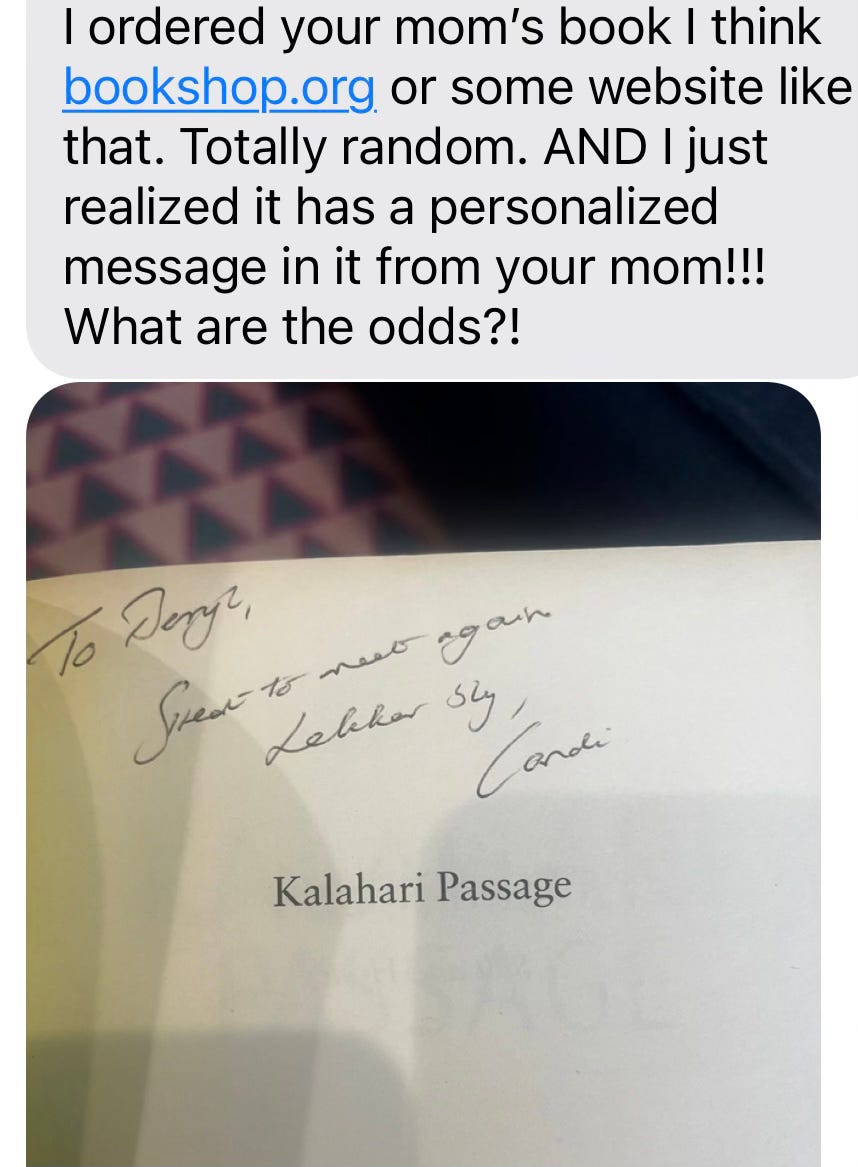Thanks to your advice and encouragement, I’m having another go at narration. Hope the above sounds a bit better than my first attempt. The written text of this newsletter post is below.
I often wish that the early copies of my novels were no longer in circulation. But even though the publisher has long been out of business and Amazon and anyone else I can reach have been sternly instructed not to sell the original copies of Salt & Honey and Kalahari Passage — a violation of the rights that have reverted to me— I still see copies lurking around the internet.
Mostly this makes me mad – not because I don’t want people to read my tale about Koba and her amazing people, but because I don’t get a brass bean from these sales for the charity I support with my writing.
But sometimes, a mini-miracle happens that makes me glad that books have a life of their own, that they can survive, cross borders and end up in the most unexpected places.
Yesterday, my daughter who lives in San Francisco, forwarded this:
It was sent to Daughter by a friend. But what are the odds of it having a personal inscription?! I only did one signing event as far as I can recall.
The inscription in the book took me back to a town in the English potteries, where my novel-writing started.
Meeting Mandela and the rest
I was a recent refugee from the moral outrage of Apartheid South Africa. I was lonely and longing for my land, despite its pariah status. On a short trip back home (South Africa remained ‘home’ in my heart and my head for about 15 years after our exodus) I literally bumped into Nelson Mandela, recently released from jail. (He was still wearing what looked like a prison-issue pullover. He was gracious and warm, kneeling down from his surprising height to talk to my tiny children. He urged us to return home to help the new South Africa. Alas, we were committed to work contracts, but I felt a responsibility to make what contribution I could, even from small town England.
Long story short, (you can read about how I came to write the first in the Koba series here) I wrote two novels about the San, first people of the area, largely excluded from the then glow of the Rainbow Nation. I was lucky enough to have the novels traditionally published – twice. It was during one of my book launches that I met Beryl.
She lived around the corner from me in that English midlands town. And here’s another co-incidence: she’d attended the same school I had in Pretoria, South Africa, albeit some decades earlier! She was lovely, though slightly intimidating to ‘outsider me’; she seemed to have acquired an Englishness as convincing as the hallmark on a piece of Wedgewood porcelain. She was supportive of my writing, attending my book launches.
My guess is that Beryl’s books were donated somewhere, ended up at Bookshop.org. and so were sold to a reader in San Francisco. I can’t even imagine how the mechanics of all that book business works these days; I try not to harumph about the fact that someone is making money from it while the intended San beneficiaries go hungry. Instead I focus on this wonderful co-incidence!
Hxaro-ish
It strikes me that the people at the centre of my novels would approve of this. The San have a custom of sharing called hxaro – though this relates to the sharing of food, essential for the survival of hunter-gatherers, they are super-generous about sharing stories and knowledge. And oh, the things they know about the plants and animals of their semi-desert world! And the vigour, humour and strangeness of their folktales. I wish they could tell you themselves.
I’m trying to facilitate that. They asked for culturally-mediated education for their children and this is being provided via the five Nyae Nyae village schools in their remote homeland. Would you consider helping by subscribing to this newsletter for just £4 or $5 a month? Your contribution would be greatly appreciated.
* Please do not purchase this version of Kalahari Passage should you find it available. I will shortly re-publish this sequel for the benefit of the charities I support. Email me to put you on a list for an Advanced Reader copy, if you’d like.








"Gorgeous English... subtle South African undertones"... I feel quite drunk on this praise. Cheers for that encouragement, Ron.
Listen here: https://candimiller.substack.com/p/funny-how-a-book-never-dies?r=1yyz2p
Absolutely loved this, Candi! Thank you for the narration and also for sharing that incredible story of coincidence, or shall I say synchronicity. What are the odds for that to happen!? Also, now I have finally heard more about you and your life story, something I wanted to enquire about for a long while. Listening is easier than reading! It is like sitting by the fire and tuning into another's presence.